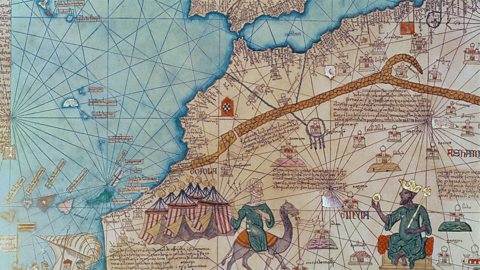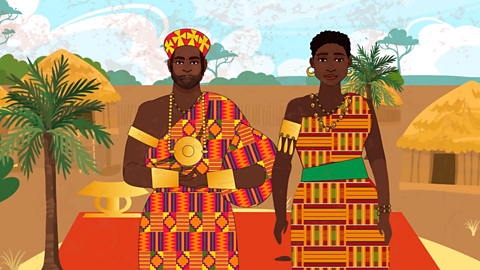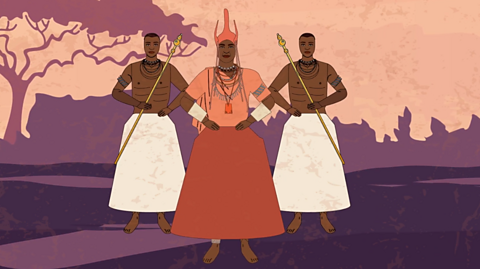Key points
- In the 1230s, a man called Sundiata Keita incorporated a series of smaller kingdoms into the Mali Empire.
- The empire was central to several key trading routes, and with the support of a well-trained army, Mali became a strong and powerful empire.
- Under the leadership of Mansa Musa, 1312 - 1337, Mali became famous for its trade in gold and the kingdom became incredibly prosperous.
- Some historians remember Mansa Musa as the āwealthiest man who has ever livedā.
Video about the Mali empire and Mansa Musa
Narrator: Musa became the Emperor of Mali, the Mansa, in 1312. His predecessor had travelled to explore the far reaches of the Atlantic Ocean and never returned. Mansa Musa ruled for the next 25 years and used Mali's military might to control the trade routes of the Sahara and the Niger River, greatly expanding the wealth and power of the empire.
As a devout Muslim going on Hajj was very important to him, so in 1324, he travelled on a pilgrimage to Mecca with 60,000 men, some of whom were enslaved. They carried gold and other riches, some of which was distributed to the poor along the route. So much gold was traded and donated that it caused the price of gold to collapse in Cairo and other cities.
On his return from Mecca, Musa invited many scholars and architects to travel home with him, bringing their great minds to Mali's cities. He built many great libraries, mosques and palaces across the empire. There were more than 400 cities in the Niger Delta. Timbuktu became the heart of his empire, the centre of trade and culture. News of wealth and learning spread far and wide. Traders and scholars from Europe, the Middle East and Africa came to live in Mali.
Musa turned Sankore mosque into a university and filled it with astronomers, mathematicians and legal scholars. It could educate 25,000 students and housed hundreds of thousands of manuscripts. Its scholars were renowned around the world and many of them travelled to other universities. Mansa Musa has supported and funded science, the arts, literature and architecture and the Empire of Mali was one of the greatest empires in the world.
Origins of the Mali Empire
In the 1230s, Sundiata KeitaThe surname of the Malian rulers (Musa Keita, Sundiata Keita). However, there is a debate as to whether it actually means āheirā in the Mandinka language of the region. united a series of smaller kingdoms and incorporated them into the Mali Empire. Leaders of the Mali Empire were called MansaThis meant leader/conqueror in the Mandinka language of the region.. Sundiata Keita became the first Mansa of Mali and ruled until his death in 1255. Storytellers called griotPraise-singers and story tellers of Mali. These men sang and told the stories of great heroes and kings passing their histories down through the generations. still share the story of his reign through a poem called The Epic of Sundiata.
From 1240 onwards, the empire expanded to include regions that were rich in gold, and the empire grew to be famous for its wealth. By the 1300s, the Mali Empire covered over 12,000 km and became the centre for trade, controlling the important cities of Timbuktu and GaoTwo cities in Mali which became a part of Mansa Musaās growing empire. They were important trading centres for salt and gold..
The empire became one of the largest in the world, stretching through what is now known as MaliThe name given to the empire developed by Sundiata Keita., Guinea, Senegal, Mauritania and the Gambia. Regions were ruled over by local leaders who pledged allegianceLoyalty to a leader. to the Mansa.

Mansa Musa
Mansa Musa ruled the Mali Empire during a period that has since become known as a 'golden age'. His predecessor, whose identity is debated, had a keen interest in exploration and set off on a voyage into the Atlantic Ocean. He chose Musa Keita to be his deputy, and he gave orders that if he did not return within a reasonable amount of time Musa Keita should take the throne. In 1312, when Musa's predecessor didn't return from his voyage, Musa Keita became the new Mansa and was called Mansa Musa.
Mansa Musa built many schools, universities and libraries, in cities like Gao and Timbuktu. Using his large army, he invaded other regions and doubled the size of his territory, growing his already vast empire. It is estimated that Mali came to control half of the world's supply of salt and gold at this time. Some historians have even described Mansa Musa as 'the wealthiest man who has ever lived'.
How have historians learned about the reign of Mansa Musa?
Knowledge of Mansa Musaās reign comes from the stories of the griots and from Arabic writers from throughout the Muslim world.Ibn Battuta was a young man who had been born into a family of Islamic scholars in Tangiers, North Africa. Battuta travelled throughout the known Islamic world. In the 1350s, he travelled through Mali to Timbuktu where he heard stories of Mansa Musa, which he wrote down. Similarly, another scholar called al-Umari visited Cairo in Egypt shortly after Mansa Musa had visited and wrote down what he had heard about the ruler.
Mansa Musaās pilgrimage to Mecca
Mansa Musa was a devout Muslim. One of the five pillars of Islam states that Muslims should embark on a pilgrimageA holy, or, religious journey. known as Hajj, to the holy city of Mecca.
Between 1324 ā 1325, Mansa Musa embarked on his pilgrimage to Mecca. On his journey Mansa Musa brought with him a large group of people, some of whom were enslaved. He also brought dozens of camels each carrying around 136 kg of gold, which he gave away on his travels. As a result of Mansa Musaās spending and donations, the value of gold decreased and it took 12 years for Egyptās economy to recover.
Mansa Musaās journey made him famous throughout the Muslim world, which stretched from southern Spain to the Middle East. It attracted scholars and visitors to Mali. People came from Ethiopia, Andalusia (southern Spain), Arabia and Turkey.
Why was the city of Timbuktu so significant to the history of the Mali Empire?
Timbuktu was founded in the 1100s by Tuareg nomadsA population of people who live across the North Africa. and within 200 years it had become an immensely wealthy city.
From the late 1200s to the early 1300s, the city became part of the Mali Empire and became central to the empireās wealth and prosperity.
Its geographical location, sitting on the edge of the Sahara desert with access to the River Niger, meant Timbuktu was at the centre of essential trading routes for salt and gold.
In Timbuktu and the neighbouring market city of DjennƩ, Mansa Musa built many Islamic schools and universities. He encouraged the development of science, architecture, literature and Islamic learning.
In 1591, Timbuktu was captured by the Moroccan army, and the city fell into decline.
Timbuktu gained notoriety amongst explorers for being incredibly difficult to find. It wasnāt until 1830 that the first European explorer travelled to and from Timbuktu.
The Fall of the Mali Empire
It is unknown exactly when Mansa Musa died, but it is estimated to be around 1337. In the centuries after his death, the power of the Mali Empire began to decline. Mali was challenged by the Songhai Empire to the north and suffered raids by the Portuguese and the Tuareg nomadsA population of people who live across the North Africa.. The Malian Mansas increasingly used violence to maintain control and many local rulers began to switch their allegiance to the Songhai Empireās leaders, who were called Sonnis.
By the late 1400s, the Songhai Sonnis had seized control of DjennƩ and Timbuktu. For nearly 200 years, the Songhai Empire was the most powerful empire in the region, until 1591, when the expanding Moroccan empire seized it. The last Mansa died in 1610.
Activity - Put the events in order
Test your knowledge
Play the History Detectives game! gamePlay the History Detectives game!
Analyse and evaluate evidence to uncover some of historyās burning questions in this game.

More on Precolonial Africa
Find out more by working through a topic
- count1 of 3

- count2 of 3
